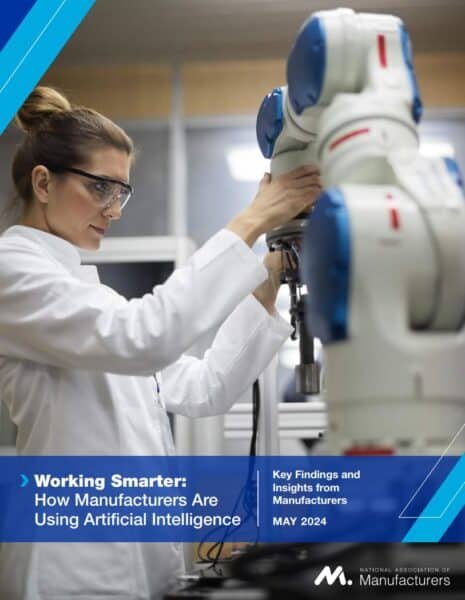With 72% of manufacturers reporting reduced costs and improved operational efficiency after implementing AI, it’s clear that artificial intelligence is transforming the manufacturing landscape. From optimizing production lines to enhancing customer service, AI enables manufacturers to streamline workflows and make data-driven decisions. These advancements don’t just improve efficiency; they also help manufacturers gain visibility and responsiveness, putting them in a stronger position for sustainable growth in a competitive market.
A. AI in Production: Streamlining Processes and Reducing Costs
AI in production has shown immense potential to boost efficiency by streamlining processes and reducing operational costs.
Predictive Maintenance
Predictive maintenance powered by AI allows manufacturers to forecast equipment issues before they lead to costly breakdowns. By analyzing sensor data and machine learning models, AI can predict when machines need servicing, minimizing unexpected downtime. As a result, manufacturers not only reduce maintenance costs but also extend equipment lifespan. In fact, 41% of manufacturers report improved process optimization and control from AI, showing its critical role in creating smoother production cycles.
Process Optimization and Quality Control
AI-driven quality control enhances product quality by detecting defects in real-time. For instance, visual inspection algorithms can instantly identify flaws, reducing waste and ensuring consistent standards. These improvements in quality management lead to more efficient production and reduce costs associated with defective products. Additionally, real-time data analytics powered by AI can optimize various production processes, ensuring every stage operates at peak efficiency.
B. AI-Powered Customer Service: Transforming the Customer Experience
AI extends beyond production, enhancing customer service with solutions like chatbots and AI agents.
AI Chatbots in Customer Support
AI chatbots have become essential in manufacturing for customer support. They can manage customer inquiries around the clock, answer frequently asked questions, and even troubleshoot issues, all without requiring a human representative. Transformative retail automation is revolutionizing how businesses interact with their customers, leveraging AI to streamline operations and enhance service quality. For businesses exploring this option, understanding how to build an AI chatbot tailored to specific customer needs is crucial. This automation boosts customer satisfaction by providing immediate, reliable responses, reducing wait times, and ensuring a seamless experience.
Personalization in Customer Experience
AI also leverages customer data to tailor experiences, such as recommending products based on previous purchases or preferences. Personalized interactions increase customer loyalty and lead to stronger client relationships.
Sales and After-Sales Support Automation
AI goes beyond customer support to improve sales and after-sales processes, helping customers choose the right products, offering assistance with order tracking, and simplifying after-sales service. This end-to-end support enhances the customer journey, resulting in more satisfied clients.
C. AI for Operational Efficiency and Cost Savings
Here is how AI can improve efficiency for manufacturing operations:
Supply Chain and Inventory Management
AI enhances supply chain management by forecasting demand, tracking inventory levels, and identifying delays. With these capabilities, manufacturers can manage inventory more precisely, reducing storage costs and avoiding shortages. This improvement in operational visibility is critical, as 51% of manufacturers report increased responsiveness and visibility with AI.
Enhanced Decision-Making with Data Analytics
AI-powered analytics provides real-time insights, helping manufacturers make data-driven decisions. By analyzing historical data, AI identifies trends and optimizes resource allocation, resulting in cost savings and increased efficiency.
How Manufacturers Can Adopt AI
For manufacturers planning to adopt AI, here are the quick steps:
Identifying Goals and Needs
To adopt AI successfully, manufacturers need to start by identifying areas where AI can address their specific goals—be it in predictive maintenance, process optimization, or customer support.
Developing an Implementation Plan
Next, creating an implementation roadmap is crucial. Starting with pilot projects allows for gradual AI integration, helping the team understand how to maximize AI’s potential.
Partnering with Experts
Working with an enterprise AI chatbot development company or AI specialists provides the expertise needed for customization, scalability, and ongoing support, ensuring a seamless AI adoption process.
Final Words
Adopting AI in manufacturing enhances everything from production efficiency to customer service, with innovations like predictive maintenance, AI chatbots, and real-time analytics leading the way. While AI implementation presents challenges, collaborating with an enterprise AI chatbot development company and planning carefully can ease the transition. As AI advances, manufacturers embracing this technology will benefit from optimized operations, reduced costs, and a personalized customer experience, positioning themselves competitively in a rapidly evolving industry landscape.
